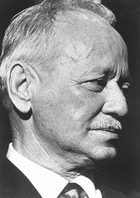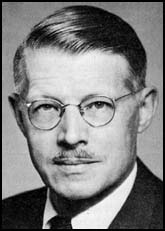
|
presents Sholokhov vs. Salisbury: ON THE LITTLE BOY HARRY AND BIG MR. SALISBURY by Mikhail Sholokhov (1960) |

|
|
|
But life continued on and, in time, as is natural, Harry turned into a youth, and then into a resourceful young man understanding the value of a dollar, and gradually he came to be Mister Salisbury, a relatively well-known journalist appearing on the pages of the no less well known American newspaper "The New York Times".
Little Harry does not interest me. For me as a writer, his life is not a find. I'm not Mark Twain, and Harry, of course, is not Tom Sawyer. But today's Mr. Salisbury does interest me, from a purely psychological point of view, and only because my creative work interests him--however, not from a psychological or artistic point of view, but from a purely political one.
Last year, Mr. Salisbury appeared in the "New York Times" with an article in which, referring to rumors supposedly circulating in "Moscow literary circles", he wrote that I had already finished my novel Virgin Soil Upturned, but concluded it with the dead of Davydov in a Soviet jail and that it was precisely because of this that the book has not been published. And as if this weren't enough, Mr. Salisbury establishes a directly link between the visit of N.S. Khrushchev to Veshenkaya (Sholokhov's home village--ed.) and the ending of the book. Mr. Salisbury, known for his malicious but foolish imagination, is traveling far, but he has chosen a dirty and dishonest road for his sensation and for earning his living.
I became acquainted with his article when I visited American last year. I jokingly noted to some representatives of the press that in the USA, Mr. Salisbury, who is not unknown in journalistic circles, is being imposed on me as a co-author, and that I had better hurry up and finish my novel since Salisbury has already come up with the ending, moreover, an ending which, apparently, best suits my uninvited co-author or his bosses: specifically,to destroy the heroes of the novel, communists, by the hands of representatives of the Soviet government. I had supposed that after this, honest little Harry would awaken in Mr. Salisbury. However, my expectations were not justified. Little Harry sleeps with a deep sleep inside businessman Salisbury; he has been strangled with dirty hands by the adult journalist Mr. Salisbury, who stops at nothing.
Then on 19 February, a new article by Salisbury appeared in the "New York Times" under the garish headline: "Sholokhov's Hero Dies a New Death". The article is new, but it repeats the previous idle conjectures, although with a few additions. For example, Salisbury writes: "...Davydov was maliciously accused by the Soviet police, arrested and locked in jail where, it is said, he shoots himself."
Why has happened to Mr. Salisbury resorted to providing information that appears to be such an obvious absurdity? He knows how to turn a phrase! But one would like to ask him: where has he seen a prison where the prisoners walk around with pistols and carry out their own trials and punishments?
The rest of the article is on the same level, and you can't tell where his meanness ends and his stupidity begins.
Near the end, referring to the final chapter, Salisbury writes: "Instead of a single finale, five episodes are presented, having little connection to each other. In the second episode, the death ofo Davydov is mentioned as if in passing, in accidental (slychainii--"casual"; "incidental"--Tr.) language."
This is already a direct intrusion into the field of art, and here I must directly say to Mr. Sallisbury: "Step aside. This, to put it mildly, is not your sphere of activity. If, in your opinion, my language in the final chapter is accidental, then the language in your article--and the very contents themselves--are by far not accidental!"
To argue seriously with Mr. Salisbury on questions of art would be to show no respect to art itself and is out of the question. A legitimate question arises for me: If Mr. Salisbury was really interested in the ending of my book, why did he not direct such a query to me, the--so to speak--primary source, in the 1930s after publication of the novel's first volume? Or why didn't he ask me about it when I was in America? Certainly he had ample opportunity to see me. I could have informed him about the denouement in a few sentences. And this denouement, as it was planned out during my work on the first volume, is exactly the same as it has turned out now, with no changes or alterations. I never made a secret of this. But Mr. Salisbury prefers to refer to conversations in "Moscow literary circles". It would be interesting to learn where he found these "circles": in the offices of the "New York Times", in his own apartment, or in Moscow at the Tishinsky market?
Mr. Salisbury has chosen a dishonorable path, but this is a matter for his own conscience--that is, of course, if he has one, be it only microscopic in size.
In the beginning of his article, Salisbury writes:
"Since the death of Little Nell in Charles Dickens's novel "The Old Curiosity Shop", published in 1841, it has been exceeding rare that the fate of a literary character would arouse such wide-spread interest."
I couldn't help but think that if, in the good old Dickensian times, the schoolboy Harry Salisbury had committed some improper act, the teacher would, without fail, have flogged him. I thought about this, and I was sorry that we couldn't flog the adult Mr. Salisbury--and we should! He has not merited a more severe punishment, but he has certainly earned the rod! I am a person of mild character, but I would be standing next to that American teacher, urging him on, shouting, "Give that naughty boy a few more good ones!"
If the corporal punishment that was used universally in the last century should seem too cruel to Mr. Salisbury, then I would act like Ignat from Chekhov's story "Whitebrow". Sighing, I would address Mr. Salisbury: "A spring has snapped in his brain. I do detest fools!" And, bringing Mr. Salisbury for punishment to some broad-shouldered American teacher's classroom, I would only say mildly, but like a firm school master:
"Go in! Go in! Go in!"
Translation by Eric Konkol
|
107 Years of Sholokhov see also: Biography of Mikhail Sholokhov |
